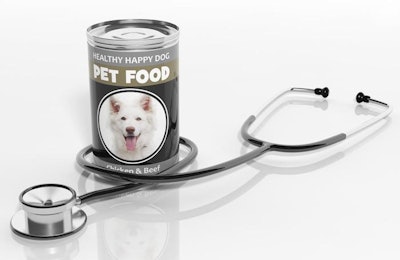
After eating canned dog food for two weeks as part of a biomedical study, dogs had higher levels of the controversial chemical bisphenol A (BPA) in their blood than when the research began. The results of the study on the possibly harmful chemical were published in Science of the Total Environment.
Concerns over BPA safety
BPA is used to line metal pet food containers. However, the chemical may disrupt hormone levels and have other health effects in both animals and people at high enough levels. The US Food and Drug Administration considers BPA safe at the levels adults consume in their foods, although FDA continues to evaluate the chemical’s effects at low levels.
Some scientists have raised concerns that even tiny amounts of BPA can influence human health. Public concern led to the widespread abandonment of BPA for use in products meant for babies and children, including baby bottles and sippy cups.
BPA’s effects on dog and cats
Little research exists on BPA’s effects on dogs and cats, reported Kansas State University professor Greg Aldrich, PhD, in Petfood Industry.
Research on laboratory rodents and amphibians provided evidence that BPA may be associated with prostate cancer, lack of sexual differentiation, declines in sperm quality, learning impairment and other health problems.
However, no safe limit for daily consumption has been stablished for pets, noted Aldrich. He presented a 1984 Environmental Protection Agency study in Beagles which reported that feeding 9,000 mg/kg BPA for 90 days resulted in increased liver weight but had no effects at lesser amounts.
Recent research on BPA in canned dog food
Previous studies have found that canned dog food consumption may increase BPA levels in dogs, and the recent research from University of Missouri biomedical scientists corroborates those results.
“The dogs in the study did have minimal circulating BPA in their blood when it was drawn for the baseline,” Cheryl Rosenfeld, associate professor of biomedical sciences in the University of Missouri School of Veterinary Medicine, said in a press release. “However, BPA increased nearly three-fold after being on the either of the two canned diets for two weeks. We also found that increased serum BPA concentrations were correlated with gut microbiome and metabolic changes in the dogs analyzed.”
How BPA enters canned dog food
Thermal processing temperature, makeup of the product contents, repeated container uses and pH swings are known to increase the amount of BPA that leaches from plastics, wrote Aldrich. Some researchers are concerned that BPA can leach out of the plastic resin in the can into wet pet food and over a lifetime of feeding have ill effects.



















